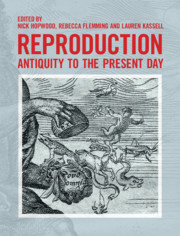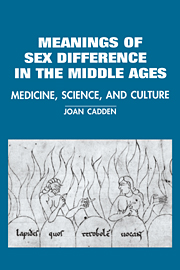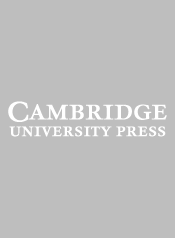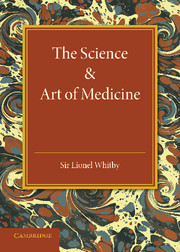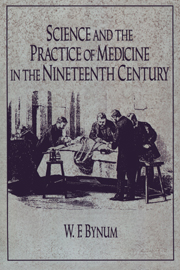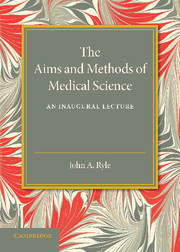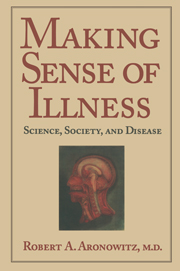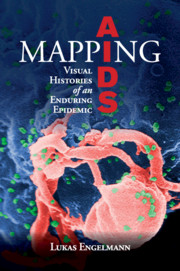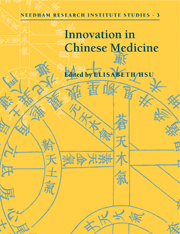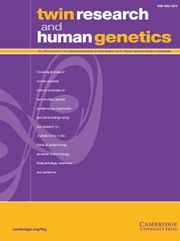Reproduction
Antiquity to the Present Day
- Editors:
- Nick Hopwood, University of Cambridge
- Rebecca Flemming, University of Cambridge
- Lauren Kassell, University of Cambridge
- Date Published: December 2020
- availability: Available
- format: Paperback
- isbn: 9781107658370
Paperback
Other available formats:
Hardback, eBook
Looking for an inspection copy?
This title is not currently available for inspection. However, if you are interested in the title for your course we can consider offering an inspection copy. To register your interest please contact asiamktg@cambridge.org providing details of the course you are teaching.
-
From contraception to cloning and pregnancy to populations, reproduction presents urgent challenges today. This field-defining history synthesizes a vast amount of scholarship to take the long view. Spanning from antiquity to the present day, the book focuses on the Mediterranean, western Europe, North America and their empires. It combines history of science, technology and medicine with social, cultural and demographic accounts. Ranging from the most intimate experiences to planetary policy, it tells new stories and revises received ideas. An international team of scholars asks how modern 'reproduction' - an abstract process of perpetuating living organisms - replaced the old 'generation' - the active making of humans and beasts, plants and even minerals. Striking illustrations invite readers to explore artefacts, from an ancient Egyptian fertility figurine to the announcement of the first test-tube baby. Authoritative and accessible, Reproduction offers students and non-specialists an essential starting point and sets fresh agendas for research.
Read more- The first large-scale history of reproduction
- Makes the topic accessible to students and non-specialists
- Richly illustrated, including numerous striking colour plates
Awards
- Highly Commended, 2019 Internal Medicine Book Award, British Medical Association
Reviews & endorsements
'A fascinating work of breath taking ambition. It is certain to become a key point of reference for scholars working in a wide range of disciplines.' Sally Sheldon, FAcSS, University of Kent
See more reviews'This ambitious and extraordinarily well-executed volume offers new and rich insights into the history of reproduction from the ancient world to the modern period. Drawing on the best scholarship, it provides a compendium, a stimulating reframing of the field, and a state-of-the-art guide to further research.' Hilary Marland, University of Warwick
'This is the most ambitious and comprehensive treatise on reproduction that has ever been attempted within the compass of a single volume. It is challenging to think of a perspective that has not been addressed. The impressive range of contributions and illustrations should guarantee the book a very wide appeal.' Sir Richard Gardner, FRS, Emeritus Royal Society Research Professor
'A milestone in reproduction studies, this magnum opus will be invaluable to scholars from multiple disciplines as both resource and inspiration for ambitious projects and innovative approaches. At once dense and refreshing, it mobilizes efforts of superb scholars to bring us up-to-date historically, transnationally and transculturally, powerfully demonstrating the centrality of reproduction in human life.' Adele E. Clarke, Professor Emerita of Sociology and History of Health Sciences, University of California, San Francisco
'This remarkably wide-ranging and lavishly illustrated history takes in everything from 'phallic fertility in the Ancient Near East and Egypt' and 'women and doctors in Ancient Greece' to population in an era of climate change, artificial fertilisation and globalisation. Among countless other topics, the dozens of contributors explore astrological medicine; our developing understanding of both 'generation' and 'reproduction'; ignorance and infertility; hormones, prenatal diagnosis and pregnancy testing with frogs; even Aristotle's strange theory that hyenas are hermaphrodite. The result is a stunning and scholarly overview of one of the central aspects of human life.' Times Higher Education
'… [a] studious, insightful brainstorm of research and revelation into an often sensitive topic. Highly recommended, especially for college and university library World History and Social Issues collections.' Library Bookwatch
'It is hard to do justice to a book of such size, complexity and range … In this project, an international group of scholars has combined to produce what has turned into an authoritative, impressive volume.' Anne Crowther, Times Literary Supplement
'By looking at the history of generation and reproduction across such a large chronological scale, such a large thematic scope (from egg to population), and in such a variety of geographical spaces, Reproduction allows us to better understand the complexity of our current world and opens up new ways of thinking about sexuality and ways of procreating … It also equips us intellectually to reflect on current issues surrounding reproduction and to develop a critical attitude toward contemporary developments in this domain. Moreover, Reproduction provides us with an excellent pedagogical tool, which is likely to help us to renew and refresh our teaching in the history of the life sciences and medicine. No doubt, this book constitutes a large and rich source of texts that will be relevant to teach and trigger discussions during seminar readings.' Marion Thomas, H-Net
'The scholarship throughout is at the highest level, the writing is engaging and informative, and the volume is lavishly illustrated … As a single-volume history of reproduction, Reproduction could not be better. It is sure to become a valuable resource for anyone engaged with the history of sexuality.' Ian Frederick Moulton, Journal of the History of Sexuality
'While illustrations are found throughout the book, the inclusion of exhibits in Reproduction is one of its greatest strengths … Reproduction … include[s] … a remarkable range of subjects from an impressive group of scholars. The editors have deftly organized this material, which ranges over such a long timeframe, into a coherent whole …' R. Allen Shotwell, Early Science and Medicine
'Reproduction builds a new synthesis of how Europeans have understood the production and renewal of life. Of particular note is the complex interweaving of the contributors' collective arguments; by engaging with each other's work, the chapters form a set of discussions where new connections and contrasts can be found beyond those normally developed in studies of more limited historical and geographical scope… Triangulating the chapters with their illustrations and the free-standing object exhibits allows readers to build complex paths through the narrative of Western attitudes to birth, reproduction and population. In sum, Reproduction is a sophisticated and comprehensive work that simultaneously summarises a generation's work in the history of science and, by the very fact of its synthesis, breaks new ground. The editors are to be thanked for the scale of their ambition for this project as is the publisher for honouring that ambition by the generous production standards the book embodies. Reproduction will become a standard work of reference but should also become a core teaching text for advanced undergraduate courses in medical history, the history of population and gender studies.' Robert J. Mayhew, Journal of Historical Geography
'Reproduction is an encyclopaedic book that is not an encyclopaedia; it is a great attempt to return to the ambitious projects of the longue durée and to tackle them from the multidisciplinary perspective of total history. A book recommended for students of the history of science, but also for professionals concerned with reproduction today.' Raúl Velasco Morgado, Dynamis
'It is difficult to do justice to Reproduction's utterly unparalleled scale and ambition, and, consequently, it is difficult to avoid bad puns, for this truly is a seminal volume. It is a hugely impressive achievement. Reproduction provides exceptional entry points for students and non-specialists while setting dozens of specialist research agendas as well as some big ones.' Zubin Mistry, Gender & History
'The exhibits provide much more accessible material for teaching … graduate students … will find plenty of inspiration and useful bibliographic materials, and scholars who teach in the area will want this collection on their bookshelves. The collection would be of particular use to modernists who want to beef up their knowledge of premodern 'generation' to enhance their research and supplement their teaching.' Lara Freidenfelds, History of Science, Technology, and Medicine
Customer reviews
Not yet reviewed
Be the first to review
Review was not posted due to profanity
×Product details
- Date Published: December 2020
- format: Paperback
- isbn: 9781107658370
- length: 764 pages
- dimensions: 246 x 190 x 37 mm
- weight: 1.92kg
- contains: 163 b/w illus. 40 colour illus. 2 maps 1 table
- availability: Available
Table of Contents
List of colour exhibits
List of illustrations
List of contributors
Acknowledgements
Notes on the frontispieces
Introduction
1. Reproduction in history Nick Hopwood, Rebecca Flemming and Lauren Kassell
Part I. Inventing Generation: Introduction to Part I Rebecca Flemming
2. Phallic fertility in the Ancient Near East and Egypt Stephanie Lynn Budin
3. Women and doctors in ancient Greece Helen King
4. Animal and plant generation in classical antiquity Laurence M. V. Totelin
5. States and populations in the classical world Rebecca Flemming
6. The ancient family and the law Tim Parkin
7. Galen's generations of seeds Rebecca Flemming
8. Debating the soul in late antiquity Marie-Hélène Congourdeau
Part II. Generation Reborn and Reformed: Introduction to Part II Lauren Kassell
9. Generation in medieval Islamic medicine Nahyan Fancy
10. The multitude in later medieval thought Peter Biller
11. Managing childbirth and fertility in medieval Europe Katharine Park
12. Formed fetuses and healthy children in scholastic theology, medicine and law Maaike van der Lugt
13. Generation between script and print Peter Murray Jones
14. Innate heat, radical moisture and generation Gianna Pomata
15. Pictures and analogies in the anatomy of generation Karin Ekholm
16. Fruitful bodies and astrological medicine Lauren Kassell
17. Family resemblance in the old regime Silvia De Renzi
18. The emergence of population Philip Kreager
19. Generation in the Ottoman world Miri Shefer-Mossensohn and Rebecca Flemming
Part III. Inventing Reproduction: Introduction to Part III Nick Hopwood
20. The keywords 'generation' and 'reproduction' Nick Hopwood
21. Linnaeus and the love lives of plants Staffan Müller-Wille
22. Man-midwifery revisited Mary E. Fissell
23. Biopolitics and the invention of population Andrea Rusnock
24. Marriage and fertility in different household systems Richard M. Smith
25. Colonialism and the emergence of racial theories Renato G. Mazzolini
26. Talking origins James A. Secord
Part IV. Modern Reproduction: Introduction to Part IV Nick Hopwood
27. Breeding farm animals and humans Sarah Wilmot
28. Eggs and sperm as germ cells Florence Vienne
29. Movements to separate sex and reproduction Lesley A. Hall
30. Fertility transitions and sexually transmitted infections Simon Szreter
31. Modern infertility Christina Benninghaus
32. Modern ignorance Kate Fisher
33. Imperial encounters Philippa Levine
Part V. Reproduction Centre Stage: Introduction to Part V Nick Hopwood
34. World population from eugenics to climate change Alison Bashford
35. Sex hormones, pharmacy and the reproductive sciences Jean-Paul Gaudillière:
36. Technologies of contraception and abortion Jesse Olszynko-Gryn
37. Hospital birth Salim Al-Gailani
38. Prenatal diagnosis, surveillance and risk Ilana Löwy
39. Artificial fertilization Nick Hopwood
40. Modern law and regulation Martin H. Johnson and Nick Hopwood
41. Sex, gender and babies John Forrester
42. Feminism and reproduction Sarah Franklin
43. Globalization Nick Hopwood
Epilogue
44. Concluding reflections Nick Hopwood, Rebecca Flemming and Lauren Kassell
Select bibliography
Index
Colour exhibits Rune Nyord, Annetta Alexandridis, Eleanor Robson, Fay Glinister, Jessica Hughes, Ralph Jackson, Véronique Dasen, Margot E. Fassler, Gabriella Zuccolin, Lauren Kassell, Lea T. Olsan, Patricia Simons, Jennifer Spinks, Karin Ekholm, Sandra Cavallo, Rina Knoeff, Lianne McTavish, Lisa Forman Cody, Mary Terrall, Lucia Dacome, Ludmilla Jordanova, Nick Hopwood, Rebecca Flemming, Mary E. Fissell, James A. Secord, Siân Pooley, James M. Edmonson, Paul Weindling, Jenny Bangham, Martina Schlünder, Jesse Olszynko-Gryn, Ellen Herman, Solveig Jülich, Wendy Kline, Patrick Ellis, Christina Brandt, Nick Hopwood, Tatjana Buklijas, Jessica Hughes and Rebecca Flemming.
Sorry, this resource is locked
Please register or sign in to request access. If you are having problems accessing these resources please email lecturers@cambridge.org
Register Sign in» Proceed
You are now leaving the Cambridge University Press website. Your eBook purchase and download will be completed by our partner www.ebooks.com. Please see the permission section of the www.ebooks.com catalogue page for details of the print & copy limits on our eBooks.
Continue ×Are you sure you want to delete your account?
This cannot be undone.
Thank you for your feedback which will help us improve our service.
If you requested a response, we will make sure to get back to you shortly.
×
